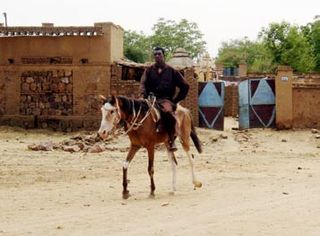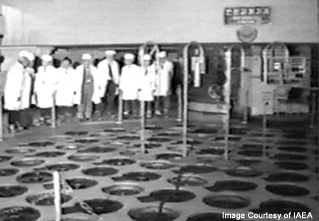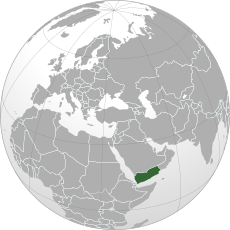
United Nations Security Council Resolution 1718 was adopted unanimously by the United Nations Security Council on October 14, 2006. The resolution, passed under Chapter VII, Article 41, of the UN Charter, imposes a series of economic and commercial sanctions on the Democratic People's Republic of Korea in the aftermath of that nation's claimed nuclear test of October 9, 2006.
The ISIL (Da'esh) and Al-Qaida Sanctions Committee is a committee of the United Nations Security Council tasked with implementing international sanctions against the Islamic State and al-Qaeda. It was established as the Al-Qaida and Taliban Sanctions Committee on 15 October 1999, pursuant to Security Council Resolution 1267, which designated al-Qaeda and the Taliban as terrorist organizations. Following the creation of a separate Taliban Sanctions Committee on 17 June 2011, it was renamed the Al-Qaida Sanctions Committee. The scope of the sanctions regime was expanded to include the Islamic State on 17 December 2015 pursuant to Resolution 2253.

United Nations Security Council Resolution 1903, adopted unanimously on December 17, 2009, renewed a travel ban on persons deemed to be a threat to the peace in Liberia for 12 months, demanding the Government of Liberia to continue enforcing an asset freeze imposed upon those sanctioned individuals. The Council also readjusted the arms embargo on the country by allowing the Liberian government and UN peacekeepers in the country to receive certain military materiel for 12 months.

United Nations Security Council Resolution 1928, adopted unanimously on June 7, 2010, after recalling resolutions 825 (1993), 1540 (2004), 1695 (2006), 1718 (2006), 1874 (2009) and 1887 (2009) on the topics of North Korea and nuclear weapons, the Council extended the mandate of a panel of experts monitoring sanctions against the country until June 12, 2011.

United Nations Security Council Resolution 1952, adopted unanimously on November 29, 2010, after recalling previous resolutions on the situation in the Democratic Republic of the Congo, including resolutions 1807 (2008), 1857 (2008) and 1896 (2009), the Council renewed an arms embargo and related targeted sanctions for a further period until November 30, 2011.

United Nations Security Council resolution 1617, adopted unanimously on 29 July 2005, after recalling resolutions 1267 (1999), 1333 (2000), 1363 (2001), 1373 (2001), 1390 (2001), 1452 (2002), 1455 (2003), 1526 (2004) and 1566 (2004) concerning terrorism, the Council renewed sanctions against Al-Qaeda, the Taliban, Osama bin Laden and associated individuals and groups for a further seventeen months.

United Nations Security Council Resolution 1982, adopted unanimously on May 17, 2011, after recalling all previous resolutions on the situation in Sudan, the Council extended the mandate of an expert panel monitoring the arms embargo and other sanctions against the country until February 19, 2012.

United Nations Security Council Resolution 1985, adopted unanimously on June 10, 2011, after recalling resolutions 825 (1993), 1540 (2004), 1695 (2006), 1718 (2006), 1874 (2009), 1887 (2009), 1928 (2010) on the topics of North Korea and nuclear weapons, the Council extended the mandate of an expert panel monitoring sanctions against the country until June 12, 2012.
United Nations Security Council Resolution 2014 was unanimously adopted on 21 October 2011.
United Nations Security Council Resolution 1896 was unanimously adopted on 30 November 2009.
United Nations Security Council Resolution 1841 was unanimously adopted on 15 October 2008.

United Nations Security Council Resolution 2021 was unanimously adopted on 29 November 2011.

United Nations Security Council Resolution 2025 was unanimously adopted on 14 December 2011.

United Nations Security Council Resolution 2035 was unanimously adopted on 17 February 2012.

United Nations Security Council Resolution 2050 was unanimously adopted on 12 June 2012. It extends the UN's mandate to monitor nuclear, chemical and biological weapons possessed by North Korea, extending the mandate of the Panel of Experts.

On March 4, 2015, the United Nations Security Council unanimously adopted Resolution 2207 on North Korea. The resolution extended the mandate of the Panel of Experts, which supports activities of the ‘1718 Sanctions Committee’, for one year to April 5, 2016.

The UN Security Council Sanctions Committee on North Korea is a subsidiary body established in 2006 by the UN Security Council's resolution 1718 in response to North Korea's first nuclear test and its other nuclear proliferation efforts.

The United Nations Security Council Resolution 2204 was unanimously adopted by the Security Council on 24 February 2015. The resolution extended sanctions on individuals threatening the stability of Yemen and extended the mandate of the Panel of Experts on Yemen for one year.













